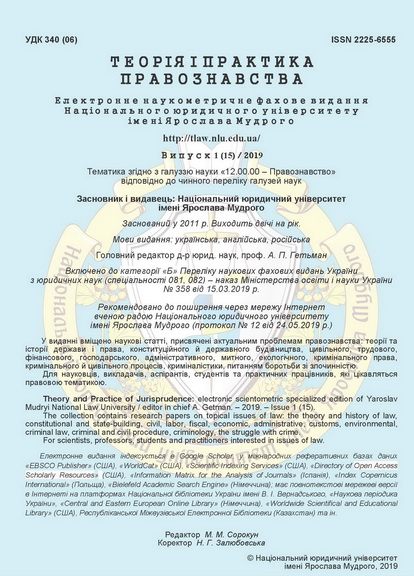Background and formation of cooperation between European Union member states in the field of defense
DOI:
https://doi.org/10.21564/2225-6555.2019.15.165264Keywords:
European integration, Western union, NATO, European defense community, European Political Community, Western European Union, The OSCE, EUAbstract
The historical way of development of integration processes in the defence sphere, starting with the end of World War II up to nowadays, appeared to be rather complicated. The European development shows, that security and defence can be provided only by successful activity of different international blocks and organization.
The main preconditions and tendencies, investigated in this article, are the basis for the further development of European security system. The investigation of European Unity members evolution of cooperation in the defence sphere gives the opportunity not only to state the main stages of such cooperation and its features on the contemporary level, but to make a forecast of its future development, taking into consideration the challenges the European Union faced with during the last years.
Among the most important preconditions for generating and formation of the European state-members cooperation in the defense sphere, the following must be underlined: the demand of peace and security, the aspiration for economic development and welfare and keeping of economic and political significance on the international arena. Proceeding from these preconditions and tendencies the European Union is widening nowadays and will widen further its own defence system.
At the same time the new challenges and threats appear. The European society has to identify them and create its effective law and institutional means to resist them. Because of the great number of threats the achievements in the international security system effect become the main task for all peoples.
It is quite clear that none of the states nowadays can independently provide its own security against contemporary challenges and threats, without the international help and collective security structures. It must be stressed (underlined) that the greatest number of contemporary challenges and threats for international security need now, and first of all non-military ways of solution for their decisionReferences
Demenko, O.F., Demchuk, P.O., Kazenko, P.O. et al. (2011). Yevroatlantychne spivrobitnytstv ta yevropeiska intehratsiia Ukrainy. Kyiv [in Ukrainian].
Cherevatyi, S.V. (2010). Rozvytok idei yevropeiskoi intehratsii ta yii znachennia dlia Ukrainy. Suchasna ukrainska polityka. Polityky i politolohy pro nei. Modern Ukrainian politics. Politicians and political scientists about her, 19, 358–366 [in Ukrainian].
Tumashov, A.V. (2000). «Kholodna viina» i yii nehatyvnyi vplyv na mizhnarodnu atmosferu v 60-80 rr. XX st. Visnyk Natsionalnoho universytetu «Lvivska politekhnika» – Bulletin of the National University «Lviv Polytechnic», issue 408, 116–122 [in Ukrainian].
Documents on the History of European Integration, Vol. 1: Continental Plans for EuropeanUnion 1939–1945. Еd. by Walter Lipgens. New York: Walter De Gruyter & Co, 1985.
Kyssyndzher, H. (1997). Dyplomatyia. Moscow: Ladomyr [in Russian].
The Brussels Treaty (March 17, 1948). URL: http://www.cvce.eu/en/education/unit-content/-/unit/803b2430-7d1c-4e7b-9101-47415702fc8e/d16547a7-de20-4a4f-9bfe-29dbfc79be69/ Resources#3467de5e- 9802-4b65-8076-778bc7d164d3_en&overlay.
Branytskyi, A.H. (2003). Ystoryia evropeiskoi yntehratsyy. Moscow ; N. Novhorod: YMЭMO RAN, FMO NNHU [in Russian].
Yevropeiske pravo. Pravo Yevropeiskoho Soiuzu ta pravove zabezpechennia zakhystu prav liudyny. L.M. Entin (Ed.). (2007). Moskva: Norma [in Ukrainian].
Ystoryia dyplomatyy. (1979). A.A. Hromyko (Ed.). (Vols. 1–5); Vol. 1. Moscow: Polytyzdat [in Russian].
Yakoviuk, I.V., Orlovskyi, R.R. (2017). Yevropeiske oboronne spivtovarystvo: vytoky stanovlennia intehratsii v oboronnii sferi. Problemy zakonnosti – Problems of Legality, issue 3, 264–277 [in Ukrainian].
Voloshchuk, S.M. (2012). Konfrontatsiia NATO i Orhanizatsii Varshavskoho Dohovoru v konteksti «kholodnoi viiny» (druha polovyna 1940-kh – kinets 1980-kh rokiv). Naukovyi visnyk Uzhhorodskoho universytetu – Scientific Herald of Uzhhorod University, issue 29, 95–101 [in Ukrainian].
Ystoryia mezhdunarodnыkh otnoshenyi. V.M. Khvostov (Ed.). (1947). (Vols. 1–5; Part 1). Moscow [in Russian].
Lapshyn, A.O. (1991). Peremenы v stranakh Vostochnoi Evropы: k chemu ony vedut. Moscow: Znanye [in Russian].
Parakhonskyi, B.O., Yavorska, H.M. (2013). Rol OBSIe u formuvanni yevropeiskoho seredovyshcha bezpeky. Stratehichni priorytety – Strategic priorities, 3, 109–114 [in Ukrainian].
Horbatiuk, S.Ye. (2017). Rol orhanizatsii z bezpeky i spivrobitnytstva v Yevropi u systemi zabezpechennia sotsiohumanitarnoi bezpeky. Efektyvnist derzhavnoho upravlinnia – Efficiency of Public Administration, 2 (51), 86–94 [in Ukrainian].
Hrebeniuk, M., Poshedin, O. (2012). Yevropeiskyi Soiuz: vid ekonomichnoi intehratsii do orhanizatsii kolektyvnoi oborony. Politychnyi menedzhment – Political management, 1/2, 212–218 [in Ukrainian].
Downloads
Published
How to Cite
Issue
Section
License
Copyright (c) 2019 Theory and practice of jurisprudence

This work is licensed under a Creative Commons Attribution 4.0 International License.




